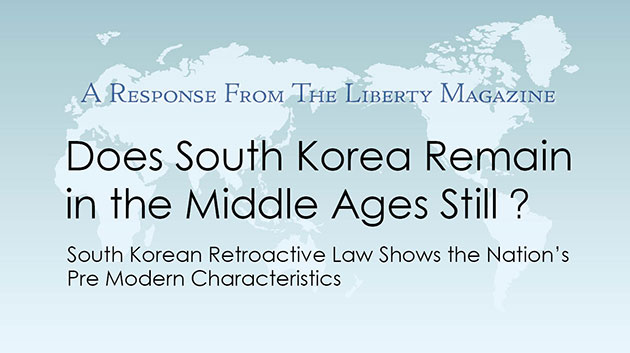Does South Korea Remain in the Middle Ages Still?
South Korean Retroactive Law Shows the Nation’s Pre Modern Characteristics
Recent moves by South Korea to nullify the 1965 treaty with Japan that settled postwar compensation reveal its pre-modern character as a nation.
For example, on July 10th, the Seoul High Court told Nippon Steel & Sumitomo Metals Corp to pay $88,000 for each Korean worker, saying that the country’s 1965 treaty with Japan, which settled postwar compensation claims, could not stop individuals from directly seeking personal compensation from Japanese corporations. (NS & SMC decided to appeal to the Supreme Court as of August 20th, but the possibility of the reversal of the decision is thought to be unlikely. The Japanese Government began to consider bringing a case to International Court of Justice, when defeat in the Supreme Court is confirmed.)
Moreover, a South Korean atomic bomb survivor filed a suit in a district court on August 12th, and said that the Japanese government hasn’t done anything to compensate him or his kind of people.
In both cases, parties should have sought to apply terms from active treaty agreements. When the two countries normalized relations in 1965, Japan proposed to offer individual compensation to South Korean people. But the South Korean government, after saying it would be better for it to receive compensation as a government package rather than as individual pay-outs, rejected this proposal.
Based on that treaty, Japan paid eight hundred million dollars, which was an amount 2.3 times the national budget at the time (this amounts to 20 trillion dollars monetary value today). Moreover, Japan abandoned its rights and gave assets to South Korea that amounted to 5.3 billion dollars at the time.
Then, South Korea gave up its right to file new compensatory claims with regard to its war against Japan. Article 2 of this treaty’s accord stipulates all claims for material compensation, and it rules out all claims against the government, companies, and individuals.
However, the Korean government, which received the compensation as a package, promised individual compensation for people from government, but it used most of its wealth for infrastructure development and hasn’t paid enough individuals. (This fact was only recently revealed.) Thus, South Korean people must make claims to their government officials for compensation. On top of that, we have to note that Japanese government had given South Korea about seven hundred-billion-dollars economic aid as an ODA, which South Korean media have not reported it its people so far.
For the latter case, since the Japanese government enacted an Atomic Bomb Survivors’ Support Law, it has already provided a large deal of medical support to victims regardless of their nationalities or places of residence. Japan has directly given four billion dollars to Korean people, but plaintiffs and South Korean journalists do not make references to this fact. Meanwhile, only a few South Korean people have begun to say, “Are we pushing too hard for compensatory claims and apologies?”
The real question should center on the retroactive character of South Korea’s laws. In 2005, Roh Moo Hyun enacted the retroactive legislation “Reorganizing the past facts for the truth and reconciliation”. He also enforced a special act to implement the asset forfeiture of the descendants of people who had pro-Japanese, wartime pasts.
These kinds of law enactments show the pre-modern character of South Korea. The principle of the modern rule of law should prohibit the involved from a return to the past where agreements were sought between parties. Yet, the law in the ancient period and the Middle Ages permitted it.
Even though the world has identified South Korea as a democratic nation, it has not allowed free speech with regard to the historical perceptions of its people. They have only been able to hold a government manufactured, historical perception. Officials haven’t allowed any critique or public suspicion.
The government recently rejected critic’s Oh Seon-hwa’s visit to South Korea just because she’s been outspoken against the country. To the extent that it cannot value a minority person’s opinion, the South Korean democracy has yet to mature.
Did you know that most of the South Korean legal terms originated in Japan? If it tries to deny Japan itself, then Korea might have to deny its own rule of law. That would be a sad contradiction.
Senior editor
Hanako Cho



















